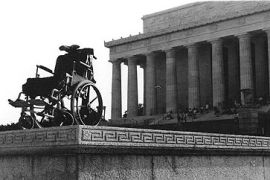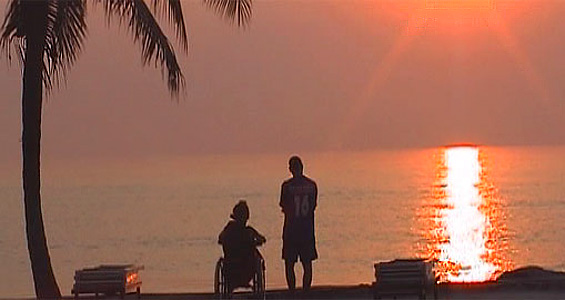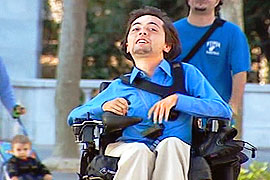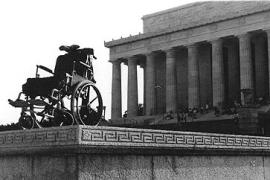When disability is not disabling
A personal journey to promote equal opportunities for people with disabilities.

 |
| As skyscrapers keep going up, highways are being built, and life starts taking over these dry lands, we will continue being equally responsible to our human family, Pineda says |
The UN’s World Health Organisation estimates that at least 10 per cent of the world’s population has some form of disability. To the advantage of the disabled, Victor Pineda is one of them.
After graduating from the University of California at Berkeley in 2000, 29-year-old Pineda embarked on a personal journey aimed at promoting equal opportunities for people with disabilities.
A degenerative muscular disorder does not faze Pineda, however, how the world looks down upon people with disabilities, does.
Though he uses a wheelchair, the journey to change mindsets has taken Pineda to distant places.
He visited Qatar recently for the third International Forum on Children with Special Needs, hosted by the Shafallah Centre for Children with Special Needs in the capital, Doha.
Job to educate
In a world where “disability is shrouded in mystery and shame; in what little exposure there is to find a solution, it’s our job to educate the masses on how to make sure that disabilities are approached the right way”, Victor said on the sidelines of the conference.
“And in a place like Qatar, you are seeing that every day.”
 |
| Pineda believes there is more potential nowadays to accommodate every disability |
The Shafallah Centre is one of the humanitarian initiatives of Sheikha Mozah bint Nasser Al-Missned, the wife of Qatar’s ruler and president of the board of directors of the Qatar Foundation for Education, Science and Community Development.
The gathering focused on building on the strengths of the disabled.
Though lean and thin, Pineda’s voice was one of the strongest.
“Society has a moral duty and an economic imperative to utilise the talents and potential of disabled people,” he said.
Victor now hopes the Doha initiative will hasten the advent of a new dawn for the disabled.
“It is centres like the Shafallah that I am thankful for, and that could utilise the latest research and my life could contribute to that,” he said.
The conference cemented a new partnership between Shafallah Centre and Autism Speaks, a US-based advocacy group that seeks to improve awareness about autism.
“The centre currently accommodates 450 children of all ages and we spend $14,000 per student each year,” Sameera al-Qassim, a member of the Shafallah’s board of directors, said.
Suzanne Wright, co-founder of Autism Speaks, said: “We are very excited about our first partnership with the Shafallah Centre.”
Pineda shares her optimism.
Major milestone
In previous efforts, Pineda has collaborated with the World Bank, ministers, policymakers and heads of state in helping to draft the 2007 UN Convention on the Rights and Dignity of People with Disabilities.
The 2007 UN Convention marks a major milestone in the effort to highlight the human rights of persons with disabilities.
 |
| ‘Disabiliies are not inherent in the victim but are realised in disabled communities’ |
Luis Gallegos, the Ecuadorean ambassador to the US and chairman of UN ad hoc committee on an international Convention on the Rights of People with Disabilities, says: “Victor inspired my role in supporting the convention.”
The convention’s rapid coming into force was due to the strong commitment of advocacy organisations such as the Victor Pineda Foundation.
A non-profit establishment, the foundation produces media items informing and inspiring a global audience on key topics concerning disability.
One of the fruits of that labour was A World Enabled, a collection of short documentaries that profile disabled people from around the world.
Pineda also collaborated with Unicef to write a child’s version of the rights of people with disabilities for children with and without disabilities, “so that they know what their rights are”, according to Victor.
The convention is presently being translated into Arabic.
In 2009, Pineda will head to Dubai to become the first Fulbright-Hayes Fellow to do doctoral research on disability studies. Completing a PhD from UCLA, his research will focus on socioeconomic development on a regional level.
‘Power of my mind’
“Just because I was born with a disability, doesn’t mean it’s the end of the world. I have the power which is much greater than any physical disability. I have the power of my mind, my thoughts, and my own ideas which is far more important for changing the world,” Pineda said.
And Pineda is certain that change is on its way, much faster than the pace of a slow-moving wheelchair that proves his disability is not a handicap, but a source of conviction.
For someone as inspired as Pineda, his physical disability is just as unlikely to be a deterrent.
Immersed in a life of success and giving back, Pineda says: “We are all God’s children. We all have a role in this world, and like the Quran says, ‘God will not give us a burden too heavy to carry’.”